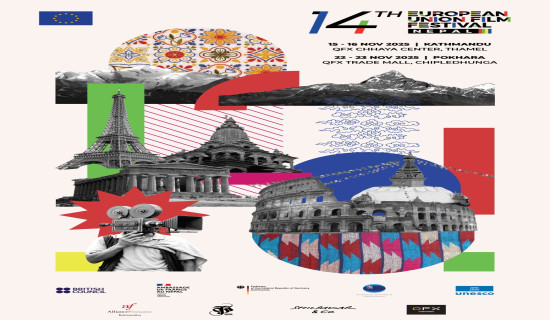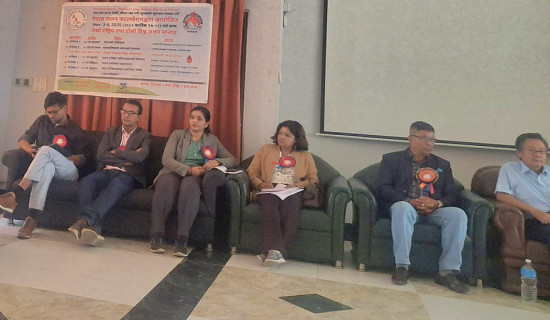- Saturday, 8 November 2025
Translation bridges cultures: Adhikari
By A Staff Reporter,Kathmandu, Dec. 23: Bal Ram Adhikari, with a PhD in translation, has made notable contributions to bridging the gulf between English and Nepali literature. He is one of the inspiring figures in the field of education and translation. A scholar, writer and translator, Adhikari has dedicated his life to the noble profession of teaching. "For me, teaching is a noble karma," he said.
Actively involved in teaching at Tribhuvan University, he takes immense pride in nurturing young minds and shaping the future of academia. His work not only enriches both the literary landscapes but also fosters a deep appreciation for cross-cultural nuances. A true scholar, he believes that knowledge without vairagya (detachment), is futile. So he has imbued the same into his academic and literary pursuits.
What drives Adhikari to it? "Perhaps passion and dedication," he professed. He looks at translation not just as a technical task but as an art in which creativity and cultural awareness are required. "It is an art as much as the creative writing," he said.
Although translation is considered secondary in some respects, for Adhikari, it is a must for national identity and sharing with the world the richness of Nepali literature. His interest in translation stems from his profound love for language and literature. Inspired by works such as 'Cry, the Beloved Country' by Alan Paton and 'Chapaieka Anuharharu' by Daulat Bikram Bista, Adhikari raises concerns about human struggle, changes in society and the contradiction between tradition and transformation. These inspirations are seen in his works, such as "Erasure", an allegorical examination of the cost of ambition and rebellion, and "Time is Dripping", a collection of visually stunning poems that delve into humanity, morality and existence.
Adhikari has a very methodical and introspective approach to work. A man of few words, he lets his work and whatever he creates do the talking. So, he believes in the power of words to shape lives and perspectives, a philosophy to which he owes to spiritual practices and an unrelenting passion for reading thinkers like Swami Vivekananda and Jiddu Krishnamurti. They had a deep impact on his thinking. For him, the Vipassana meditation was a life-changing event.
"Vipassana has set me in the direction of a more balanced and meaningful life," he said. Despite his accomplishments in academia and creative writing, Adhikari is well aware of the challenges in the field of translation.
He feels the younger generation shows no interest in translation and that very little Nepali literature has been translated into the English language. He envisions a changed literary landscape where translation takes a central stage in bringing world literature to Nepali readers and vice versa. "For me, translation is not a profession; it is a bridge between cultures—it is healing a divide and building understanding," he said.
Adhikari has several literary and academic contributions to his credit. To this, he added scores of research articles, books and essays in their own right—all imbued with profound insight into language and culture. His works in technical translation are very conspicuous, though he considers this only a "cash crop" to give visibility to creativity. "To me, creative writing and translation are surrogate representatives of the artistic soul," he said.
His life is an example of the balance between spirituality, creativity and intellectual rigour. The multidimensional personality of Adhikari is further exemplified through his love for music, most especially his two-year training in violin playing, and his appreciation of poets like Rumi and Khalil Gibran.
Through their words, he feels that wounded souls are healed. He believes in establishing his value system—a system that is based on the transformational power found in words and the wisdom they convey.
His philosophy is simple yet deep: action and reflection must go hand in hand. He puts a strong call to theorise practice, as he feels, "The epistemological base in Nepali academia was weak." His work is the living embodiment of this belief, as he reflects continuously on experiences to produce knowledge that is both practical and meaningful to people.
Adhikari's life and literary works serve as an inspiration to his students. "His work not only raises the level of academic and literary circles but also builds a bridge between cultures and generations," Chandra Bahadur Lama, Adhikary's student, said. "With such dedication, he proved that translation and writing are much more than a profession—acts of creation, connection and cultural preservation."

















